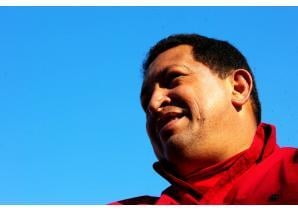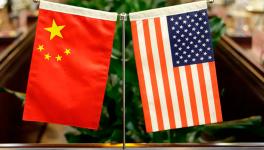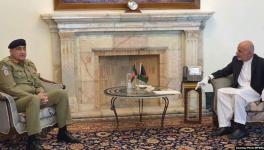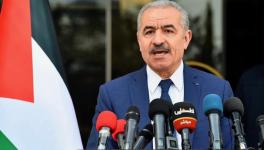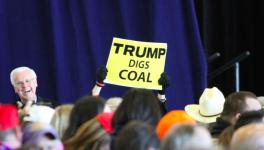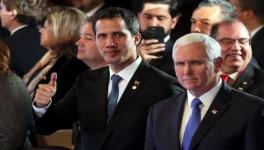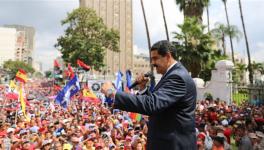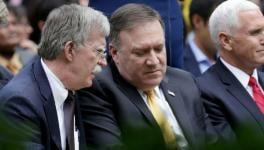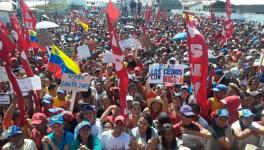Venezuela and Latin America after Chávez The Revolution Begins Today
By definition, a revolution is a collective process, not a one-man endeavour. While the social and political legacy of Hugo Chávez is remarkable, the Bolivarian Revolution has been intrinsically tied to him as the leader. With Chávez's death, the Boliviarian Revolution faces a fundamental test.
Hugo Chávez has entered the Latin American iconography beside Simón Bolivar and Che Guevara, two of his favourite historical figures. In the coming days, his mausoleum will become a place of pilgrimage for fans among the poor majority of Venezuela and left-wing activists from around the world. Like Spain’s El Cid, even in death Chávez will continue to ride his horse and win the forthcoming Venezuelan elections. The future of the Bolivarian revolution cannot be taken for granted, however
This week we will read multiple editorial pages where serious analysts from very different ideological perspectives will unpack the many reasons for why millions of Venezuelans so blindly trusted a charismatic and previously unknown military commander to lead them to a better future – and why many more millions across Latin America — and the South, more generally — mourn his passing as the loss of a very close friend.
What Chávez and his Bolivarian Revolution managed to achieve [...] has to be admired.
Photo by Bernardo Londoy
The truth is that millions of Venezuelans live better today than before Chávez took office in 1999. It is true that the domestic economy is shaky and that inflation is high, that the crime rate is horrendous, that access to sugar and other basic goods has not always been guaranteed, and that power outages have been unbearable in the recent past. But it is also true that in Venezuela poverty in all its variations and manifestations has fallen steadily and visibly in the past two decades -- from 71% of the population in 1996 to just 21% en 2010 (and from 40% to 7.3% as far as extreme poverty is concerned). It is also indisputable that the real income of workers has risen, that social sectors previously excluded from the market have had access to subsidised products for family consumption, and that national wealth has been distributed in a more egalitarian manner than in most other countries of the region.
The United Nations’ Economic Commission for Latin America and the Caribbean (ECLAC) recognises that the Bolivarian social programmes known as misiones have boosted the literacy rate up to 98.5% and that the enrolment rate for students has increased to 92.7% for primary school and 72.8% for high schools. Venezuela’s position in the Human Development Index has remarkable improved in the past decade, from a HDI value of 0.656 in the year 2000 to 0.735 in the year 2011. Between 2000 and 2011, life expectancy at birth increased by four years, mean years of schooling increased by almost two years and expected years of schooling increased by more than three years.
While some may say that this derived from Venezuela’s oil affluence, it is indisputable that the same opulence only served to enrich a parasitic kleptocracy before Chávez took office. As UN Secretary General Ban Ki-Moon confirmed following Chávez's death: “President Chávez spoke to the challenges and aspirations of the most vulnerable Venezuelans”. The most vulnerable indeed have much reason to mourn Chávez’s passing. Under his leadership, a wide range of social projects integrated within the misiones were deployed throughout the country. While the ad hoc planning and management features of these initiatives have been criticised, the misiones have expanded access to health care and education to every corner of the country.
It may be true that the new doctors and nurses are Cubans, that the quality of the diplomas and degrees issued by the new Bolivarian schools and universities could have striven to attain a higher standard, that massive slums remain despite the Bolivarian housing programmes and that the popular local markets opened by the government were not a real solution to the scarcity of essential goods. It may also be true that Venezuela’s chronic dependence on oil production and the primarisation of the economy deepened, and that Venezuela has been unable to break free from the ‘Dutch Disease’ and the ‘resource curse’. No doubt there is much more to criticise about how social and economic policies were designed and implemented under Chávez’s leadership. But what Chávez and his Bolivarian Revolution managed to achieve in the face of hostile opposition from powerful elites both within Venezuela and from the day he was first elected to the day he died – has to be admired.
So many journalists and academic researchers who have published appraisals of Chávez as the leader of the Bolivarian revolution have not been concerned to be objective or even factual in assessing what has really been achieved from the perspective of the previously excluded majority of poor. A constant during the past years has been a malicious fixation with Chávez as an individual, depicting him as a one-man show, as an evil dictator, as an irresponsible and not-so-smart clown, or as the messiah of a global socialist revolution to come. Little serious attention has been paid to the complex and internally contradictory set of socio-economic relations that shape contemporary Venezuela.
The destructive fixation with Chávez is nowhere more perceptible than in the European press. Being a daily reader of El País, I do not recall any positive coverage in any article or opinion piece published by the leading Spanish newspaper — which portrays itself as a source of top-quality journalism and open to ‘progressive’ perspectives — during the years that Chávez was in government. I certainly recall plenty of adverse reporting, much of it editorial comment disguised as unbiased news.
Following the clean election reports issued by the Carter Foundation and other independent electoral observers, the mainstream media focus on the ‘dictatorial’ characteristics of Chávez’s government no longer flies. Attention has since turned to the economy. It was reported that Venezuela, under Chávez, was heading towards economic meltdown, arguing that there is a convergence of an ill-performing oil industry in state hands, a huge public deficit, a never-ending expansion of a swollen public sector, mammoth national debt and an inefficient banking system.
In response to such gloomy perspectives, some more balanced analysts — such as Mark Weisbrot, in recent pieces published by The New York Times and the Guardian — have denounced the obvious hyperboles, misrepresentations and biased interpretation of data. A more detailed and objective analysis of the recent evolution of the Venezuelan economy published by none other than the International Monetary Fund (IMF) shows that the public deficit represents just 7.4% of GDP, well below the two-digit figures exposed by Chávez’s right-wing critics. The available data also demonstrate that the debt remains just above 50% of GDP, a much healthier ratio than the average in the European Union (82.5%) and well below the target set by Brussels (60%).
Journalists and opinion-builders claim that Venezuela has become a failed socialist state
Moreover, while some journalists and opinion-builders claim that Venezuela has become a failed socialist state characterized by an artificially bloated public sector, the data analysed by Weisbrot indicates that the Venezuelan state employs approximately 18% of the working population, which is lower than in France and in the Scandinavian countries. And while high inflation — a widespread problem across Latin America— remains a source of distress, the fact that the government has invested heavily in social policies to the benefit of the poorer sectors of the population should also be taken into account.
Following their president's death, Venezuela must hold new elections in the coming weeks. Hugo Chávez and the various incarnations of his party, most recently the United Socialist Party of Venezuela (PSUV), have won 13 of the 14 democratic elections since 1999. There is every chance that the Bolivarian side will win this next election too.
Chávez was a leader who enthusiastically embraced the opening of new opportunities for citizens’ participation beyond the limits of traditional representative democracy. In the context of TNI research work in Venezuela since 2006, I have been direct witness of the constraints and shortcomings of innovative spaces such as the consejos comunales (community councils) and the mesas técnicas (community-based councils for the management of water and other public services), but also of the empowering dimension of participatory democracy for individuals and groups previously excluded from politics. The legacy of this should not be under-estimated.
At the same time, there is no doubt that the demonization of the Bolivarian process will continue, despite or more likely because of the absence of Chávez. Venezuela has massive oil reserves which will be of great interest to big powers that have shown little hesitation in intervening in the national politics of the Middle East and North Africa to ensure their continuous control over energy resources. One can expect that they will be more than inclined to support regime change in Caracas too, especially since the demise of their most fervent opponent – nationally and internationally.
There is no doubt that the demonization of the Bolivarian process will continue
Any evaluation of Chávez’s legacy should also pay attention to the broader region. From the late1960s to the early 1990s, most Latin American governments were under the control of military dictators or corrupt and corporate friendly politicians. The ascension of Chávez to national office in Venezuela marked a rupture with a decades-long trend, opening the way for the expansion and ongoing popularity of left or centre-left governments throughout the region. In 2004 an international conference on the Latin American Left (the Madison Dialogue) was co-organised by TNI and the University of Wisconsin’s Havens Centre . The regional picture was totally different then from that we observe today. But when Chávez had won his first election a few years before, the differences were even starker.
Then, the prevailing economic dogma was neo-liberalism and a left-turn in the region was unforeseen even by the most canny political scientists of that time. It took some years after Chávez's first election for other progressive presidents to take office – in Argentina (2003), Brazil (2003), Uruguay (2005), Bolivia (2006), Ecuador (2007). Chávez pioneered constitutional reform to give legal recognition to new and expanded rights, and Bolivia and Ecuador later followed suit. Chávez was also the first to re-nationalise public enterprises. He changed the path of regional integration by creating the Bolivarian Alliance for the Peoples of the Americas (ALBA), killing the Free Trade Area of the Americas (FTAA) proposed by George Bush at the hemispheric summit of Mar del Plata, and more recently requesting Venezuela’s entry to Mercosur based on a different understanding of integration – one that goes beyond just business and profits. While Hugo Chávez cannot be credited solely for all the achievements and failures of the left in Latin America, he should certainly be recognised as the pioneer in a number of areas that have influenced the direction of the region as a whole and which now serves as a beacon of hope for progressives everywhere.
As Uruguay's President Jose Mujica, a former Tupamaro guerrilla commander declared: “You are always saddened by a death, but when you are talking about someone who has fought on the front line, and about someone who I once called 'the most generous leader I have met’, the pain takes on a whole new dimension”.
Courtesy: tni.org
Disclaimer: The views expressed here are the author's personal views, and do not necessarily represent the views of Newsclick
Get the latest reports & analysis with people's perspective on Protests, movements & deep analytical videos, discussions of the current affairs in your Telegram app. Subscribe to NewsClick's Telegram channel & get Real-Time updates on stories, as they get published on our website.









